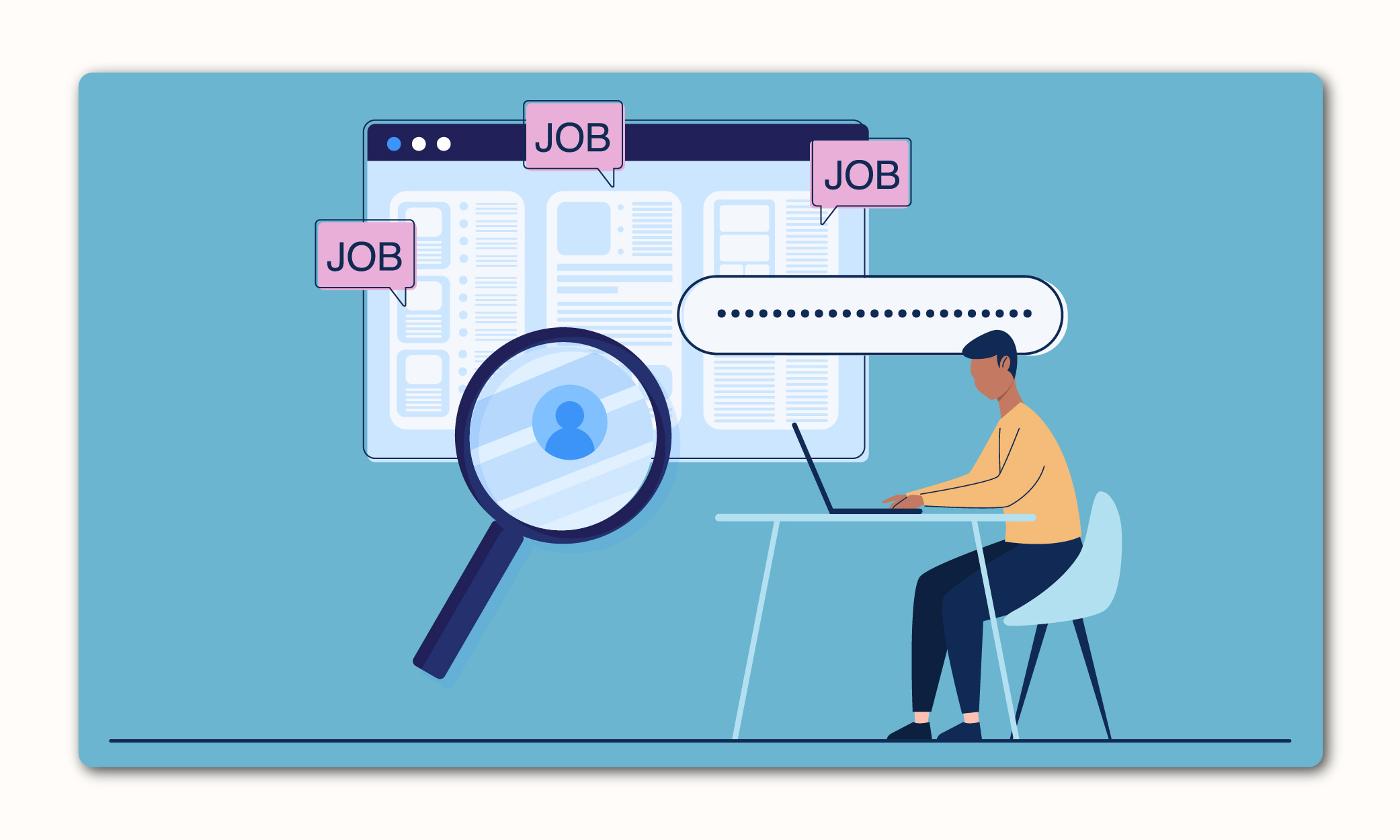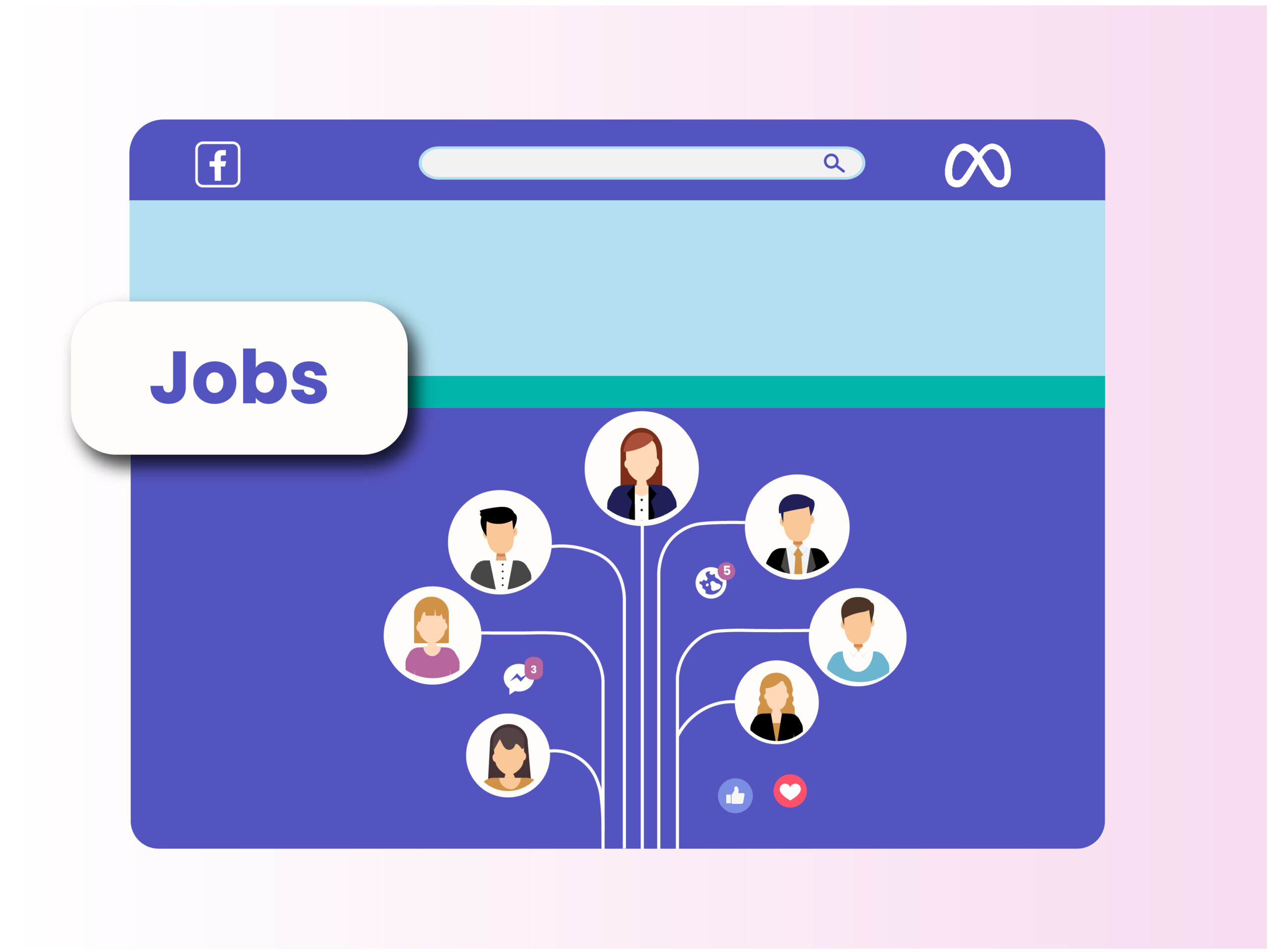What Is an Employee Value Proposition?
An employee value proposition (EVP) is what makes a company stand out as an employer of choice. It’s the unique set of benefits and values that a company offers to its employees. And that means everything from compensation and benefits, to career growth opportunities, and company culture.
In simpler terms, an EVP is like a promise a company makes to its employees. It tells them what they can expect from working at the company and why it’s a great place to work. It’s about creating a space where employees feel valued, supported, and motivated to do their best work. A strong EVP is essential for attracting top talent, retaining employees, and building a positive employer brand.
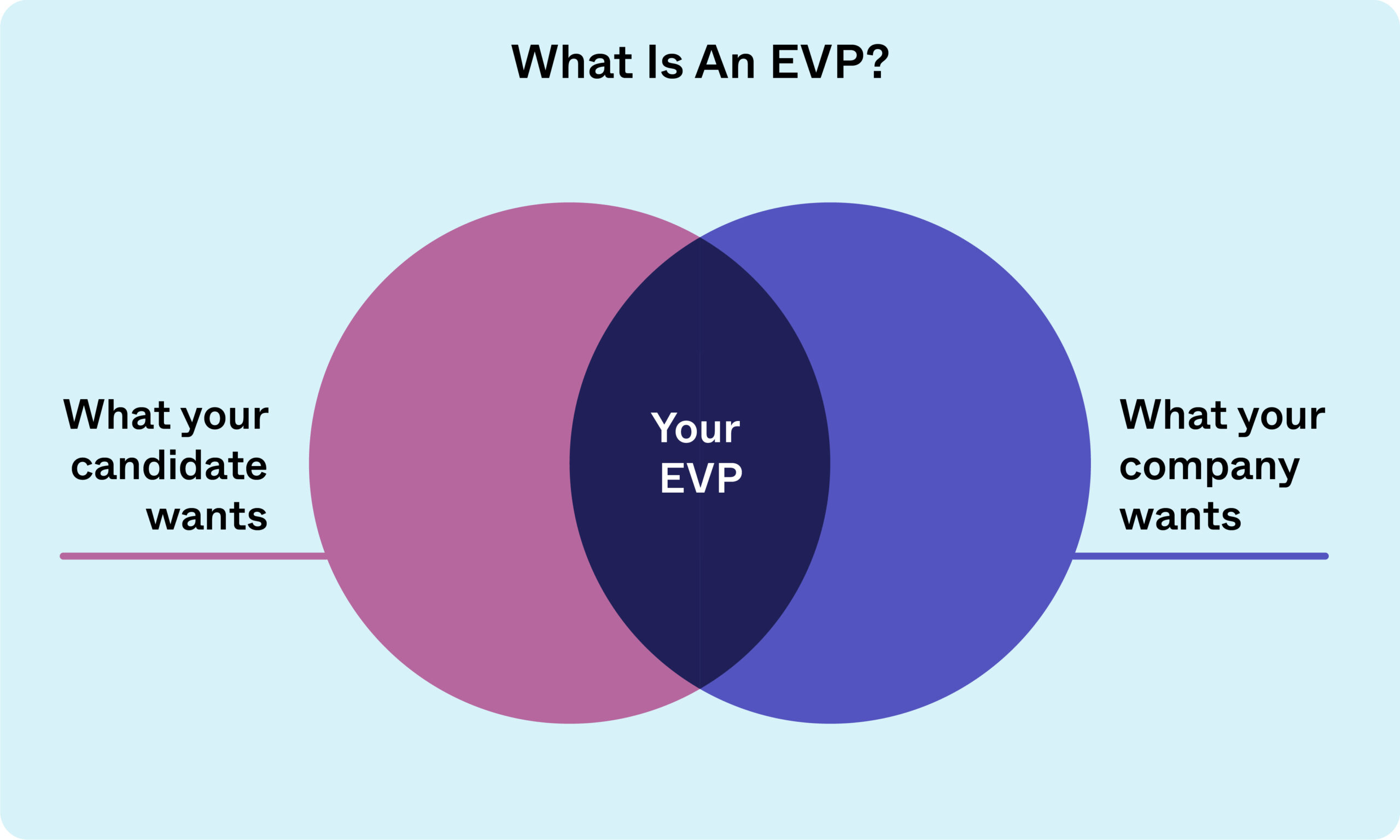
What Is the Difference Between EVP and Employer Branding?
Employee value proposition and employer branding are two critical aspects of attracting and retaining talent, but they serve distinct purposes. The EVP focuses on the unique benefits and rewards that employees receive in exchange for their contributions to the company. That includes factors like salary, non-monetary benefits, career development opportunities, work culture, and the overall employee experience.
On the other hand, employer branding focuses on the company’s reputation as an employer. It includes how the company is perceived by current employees, potential candidates, and the overall job market. Employer branding is defined by factors such as company culture, values, leadership style, and the overall employee experience.
In essence, the EVP is an internal-facing concept that defines what employees can expect from the company, while employer branding is more external-facing, shaping how the company is perceived by the outside world. Both EVP and employer branding are crucial for attracting top talent and building a strong brand.
What Is the Importance of EVP for an Employer?
The employee value proposition is crucial for employers because it helps attract and retain top talent. A strong EVP communicates the unique benefits and rewards that employees will receive, setting the company apart from competitors. This can help attract candidates who align with the company’s values and culture, leading to higher job satisfaction and employee engagement.
A compelling EVP can also improve employee retention rates. When employees feel valued and see the benefits of working for the company, they are more likely to stay long-term. This can lead to cost savings for the company, as recruiting and training new employees can be expensive. Overall, a strong EVP can help create a positive employer brand, enhance the company’s reputation, and ultimately drive business success.

How Employers Benefit from a Strong EVP
- Attract more qualified talent: Highly qualified candidates are the ones who have the right skills and are alsoaligned with your company’s values and culture. A compelling EVP is the magnet that attracts these candidates to your company. For example, if your EVP emphasizes a strong commitment to employee development, you may attract candidates who are eager to grow their skills and advance their careers within your organization.
- Boost employee engagement and productivity: An EVP that resonates can lead to a boost in engagement and productivity. When employees feel that their contributions are valued and that their work is meaningful, they are more likely to be engaged in their tasks and motivated to perform their best. This can result in higher productivity levels and overall business success.
- Improve company culture: Crafting a clear and authentic EVP can do wonders for your company’s culture. When your EVP aligns with your values and is reflected in your day-to-day operations, it can create a positive work environment where employees feel supported, valued, and motivated. This harmony creates a ripple effect, boosting morale, fostering stronger teamwork, and knitting together a more unified and inclusive culture for everyone to thrive in.
- Reduce annual employee turnover: High employee turnover drains resources and hinders sustainable growth. A strong EVP can help reduce employee turnover by creating a more satisfying and fulfilling work experience. When employees feel that their needs are being met and that they are valued by their employer, they are less likely to seek opportunities elsewhere.
What Are the Elements of an EVP?
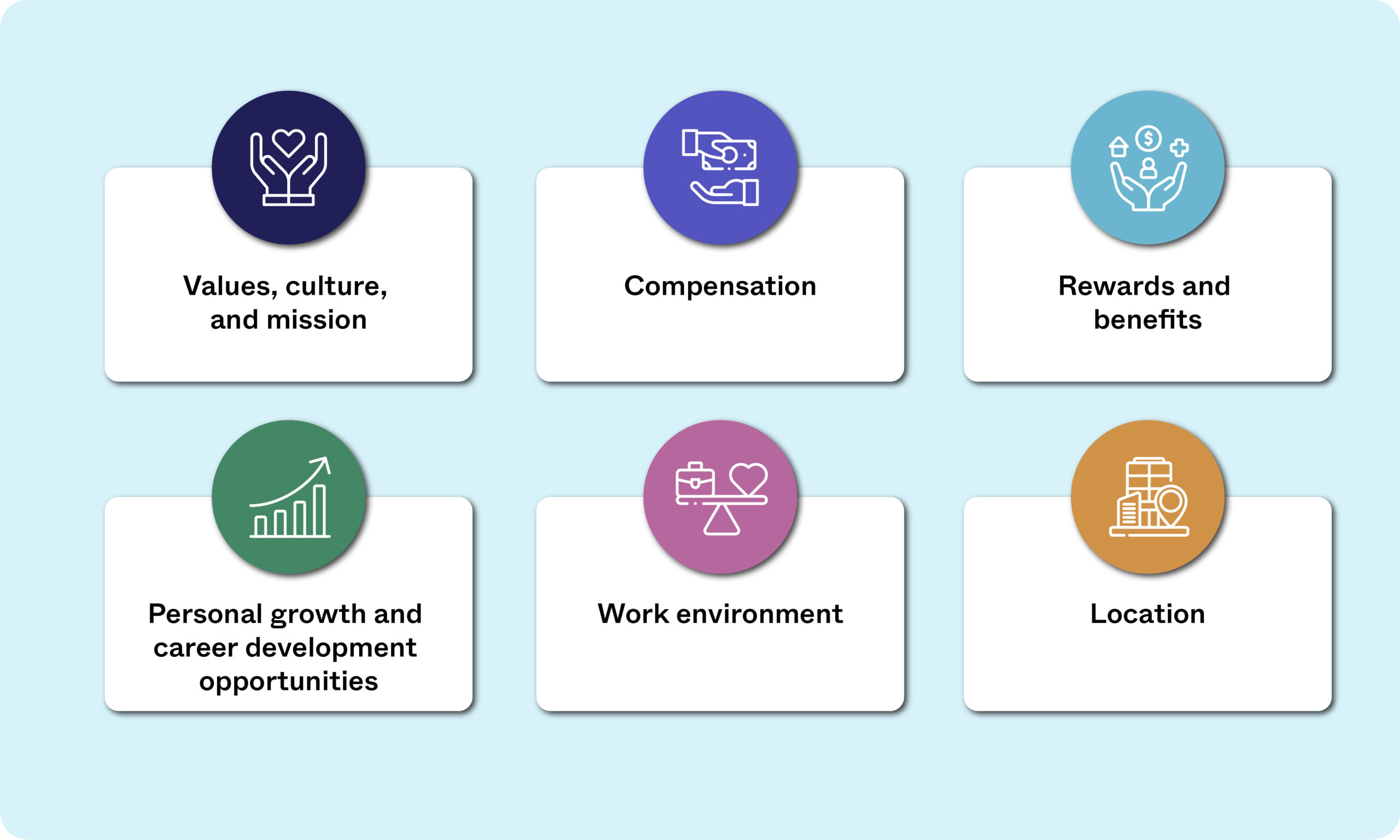
- Values, culture, and mission: These elements form the heart and soul of a company’s EVP. They represent what the organization stands for, its unique culture, and its broader mission beyond just making profits. These elements stand as the foundation of the organization as they provide stability and shape the overall company structure. For example, if a company’s culture values creativity and innovation, its EVP might include opportunities for employees to pitch new ideas and explore innovative solutions.
- Compensation: Everyone cares about getting paid well and this element of an EVP deals with the tangible rewards like salary, bonuses, and other financial rewards. Good compensation is important because it helps employees meet their needs and feel financially secure.
- Rewards and benefits: In addition to compensation, this element includes other components that enhance the employee experience: stock options, health insurance, retirement plans, and paid time off, to name a few. These benefits are like the toppings on a pizza; they make it better and more fun. For example, a company that offers generous health benefits and flexible work arrangements as part of its EVP may appeal to candidates seeking a healthy work-life balance.
- Personal growth and career development opportunities: This element focuses on the opportunities for employees to learn, grow, and advance in their careers. It includes training programs, mentorship opportunities, and chances to take on new challenges. For example, a company that provides extensive training and development programs as part of its EVP may attract candidates who are eager to learn and grow professionally.
- Work environment: It’s important for employees to feel comfortable at work and enjoy the atmosphere around them. This covers things like how they’re recognized for their work, how much freedom they have, their work-life balance, the challenges they face, and how clear their role is. These factors can greatly affect how comfortable and motivated employees are.
- Location: The physical location of a company’s offices or facilities is a key element of its EVP, although its significance has evolved with the rise of remote work. While remote work has made physical location less decisive, top candidates still value “local” factors. These include the ability to maintain normal working hours in their time zone, receive benefits in their country of residence, or even take local public holidays off.
How to Create a Successful EVP
- Audit your existing offering: Start by taking stock of what your company currently offers to employees. Identify your strengths and unique selling points. For example, if your company offers competitive compensation packages or a strong culture of employee development, these could be key elements of your upcoming EVP.
- Gather and analyze employee feedback: Listen to what your employees have to say about their experiences. Conduct surveys, hold focus groups, or simply have open conversations to gather feedback. This can help you understand what aspects of your current offering resonate with employees and what areas need improvement.
- Track your competitors: Keep an eye on what the competition is offering in terms of employee benefits and perks. This can help you stay competitive and identify areas where you can differentiate yourself. For example, if you notice that a competitor is offering a unique benefit that is highly valued by employees, you may consider incorporating a similar offering into your EVP.
- Draft your employee value proposition: Based on your audit and feedback, create an EVP that highlights what makes your company a great place to work. Focus on your unique strengths and what sets you apart from other employers. Your EVP should be authentic and reflect the true essence of your company culture. Remember, no fluff!
- Get internal buy-in: It’s important for key stakeholders within your organization, including senior leadership and HR, to be aligned on the new EVP. Make sure they understand the value of an EVP and are committed to supporting its implementation. This can help ensure that the EVP is effectively communicated and integrated into your company’s practices.
- Get the word out: Once your EVP is finalized, it’s important to communicate it effectively to both current and potential employees. Use a variety of channels, such as your company website, social media, and internal communications, to share your EVP and its benefits. This can help attract top talent, retain existing performers and reinforce your employer brand.
- Manage, monitor, and review your employee value proposition: Creating a successful EVP is an ongoing process. Continuously monitor and review your EVP to ensure it remains relevant and effective. Keep gathering feedback from employees and making adjustments as needed to keep your EVP competitive and attractive at all times.
From vision and objectives, to understanding underrepresented job seekers, and designing an inclusive approach to hiring, we’ve got you covered.
Looking To Up Your DE&I Game?
How Do You Write an EVP?
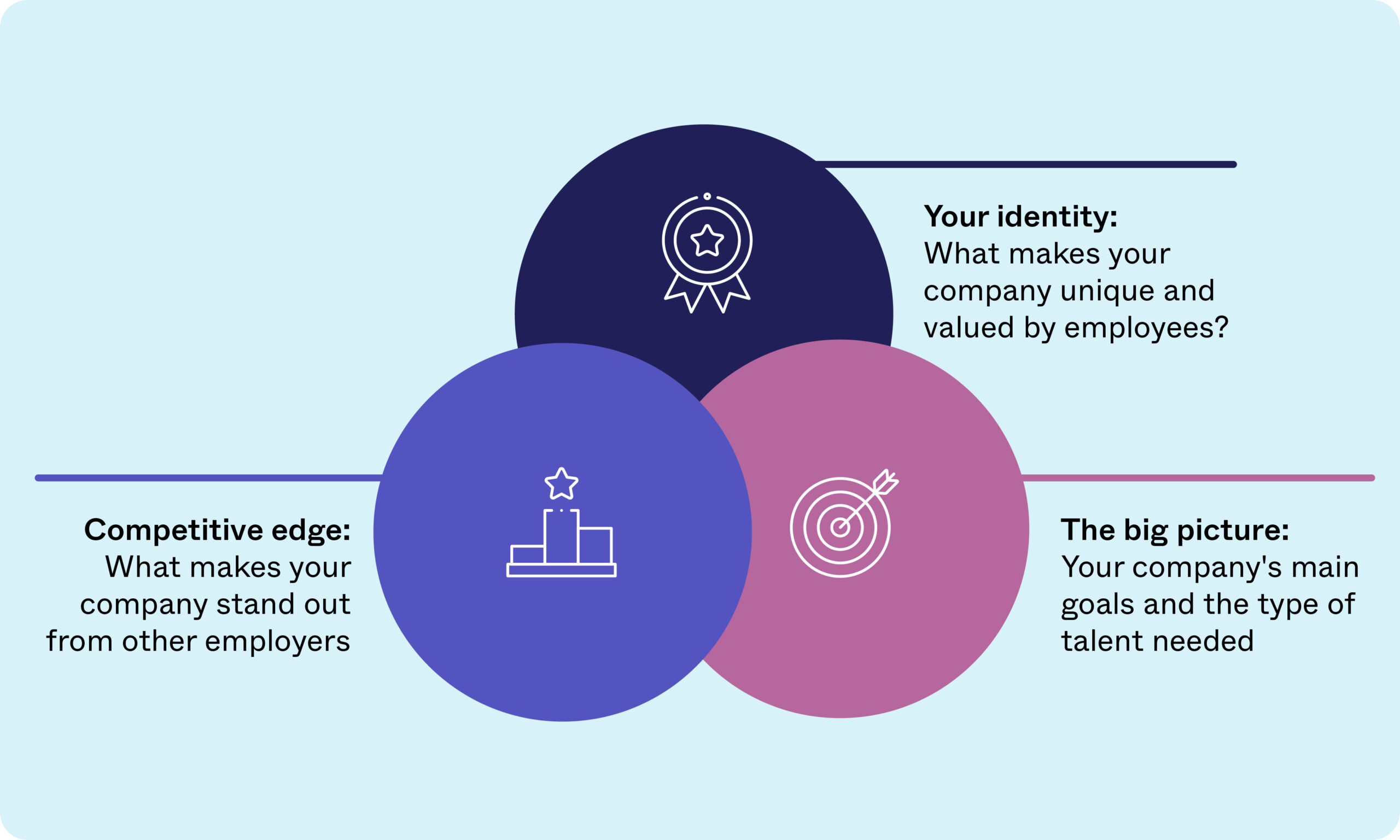
Writing an effective employee value proposition requires striking a balance between attractiveness and authenticity. You might get tempted to use buzzwords and make your company sound cool and appealing, but it’s essential to remember that your EVP reflects the reality of working at your organization.
Start by clearly outlining what your company can offer to employees. This includes tangible benefits like compensation and perks and intangible aspects like company culture and values. Next, consider what your competitors are offering and how you can differentiate your EVP. Finally, describe the experience that employees can expect from multiple milestones like their first day, first month, first quarter, etc.
By carefully balancing these elements, you can create an EVP that is both compelling and realistic, helping you attract top talent and build a strong employer brand.
Employee Value Proposition Best Practices
- Be specific: Avoid generic statements and be precise about what makes your company a great place to work. Highlight specific benefits and opportunities that set you apart from other employers. For example, instead of saying “we offer career growth opportunities,” specify how employees can grow, such as through mentorship programs or access to advanced training courses. This helps candidates understand exactly what they can expect from your EVP.
- Differentiate with impact: Consider what truly sets your company apart as an employer of choice. Present a genuine and tangible representation of your organization and its unique offerings. Highlight specific programs or initiatives that demonstrate your commitment to employee growth and well-being. This approach not only attracts top talent but also ensures that your EVP resonates with candidates who are the right fit for your company culture.
- Ensure target group-specific branding: Tailor your EVP to resonate with different groups of potential employees. If you’re targeting recent grads, emphasize opportunities for growth and learning. If you’re after experienced professionals, highlight leadership development or work-life balance initiatives. By understanding the specific needs and aspirations of different groups, you can create a more compelling EVP.
- Consider the full lifecycle: Your EVP should accurately represent your company at every stage of the employee journey, from recruitment to motivation and retention. It’s not just about attracting candidates; it’s about creating an experience that keeps them engaged and motivated throughout their time with your organization. For example, if your EVP promises a supportive work environment, ensure that this promise is fulfilled not just during the recruitment process, but also during the employee’s tenure with your company.
Employee Value Proposition Examples
Hubspot

HubSpot is widely known and appreciated for its customer relationship management (CRM) platform. It’s also a great example of a company that offers flexible work options. Employees can choose to work from home, the office, or a mix of both. HubSpot values transparency, autonomy, and commitment from its employees. In return, they offer transparent and competitive pay, flexible work hours, and unlimited vacation time.
HubSpot has a “Culture Code,” which is a set of values that guide how employees work and grow at the company. The Culture Code focuses on four main ideas: autonomy (having freedom in your work), transparency (being open about what’s happening in the company), mission (working towards the same goal), and HEART (being humble, empathetic, adaptable, remarkable, and transparent). This shows that HubSpot cares about its employees’ growth and wants them to succeed both at work and in their personal lives.
Salesforce
Salesforce, a leader in enterprise software, has an EVP centered on three key pillars. Firstly, it offers meaningful work, aligning employees with a compelling mission to help customers connect and improve the world. Secondly, it emphasizes a positive culture, fostering transparency, innovation, and customer success. Lastly, Salesforce focuses on recognition, ensuring employees feel valued and rewarded for their contributions.
Salesforce’s EVP reflects its commitment to providing employees with purposeful work, a supportive culture, and recognition for their efforts. This approach helps attract and retain talent while fostering a sense of purpose and fulfillment among its workforce.
Netflix

Netflix’s employee value proposition revolves around its core values of “freedom and responsibility.” The company prioritizes autonomy, flexibility, and trust, offering competitive compensation and benefits in return. Netflix encourages independent decision-making and open, candid communication among its employees. This EVP is reflected in the company’s culture of candor, where feedback and debate are encouraged.
Netflix’s EVP attracts those who value freedom, creativity, and excellence, helping the company stay competitive in the entertainment industry.
Airbnb
Airbnb’s EVP focuses on inclusivity, diversity, and belonging, aligning with its mission to “create a world where anyone can belong anywhere.” The company offers travel benefits, including experience credits and annual travel stipends, encouraging employees to explore new cultures and places. These perks make Airbnb an attractive choice for those interested in travel and global experiences, fostering a sense of adventure and open-mindedness among its employees.
Canva

Canva, popular for its online design and publishing platform, emphasizes employee experience through its EVP. Focusing on inclusivity and diversity, Canva provides employees with flexible work arrangements, generous parental leave, equity packages, and well-being allowances. These offerings, coupled with a strong company culture create an environment where employees feel valued and supported, fostering creativity and innovation.
Canva’s commitment to its EVP is evident in its global success and reputation as an employer of choice. By prioritizing a positive work culture and offering meaningful benefits, the company attracts top talent that help them thrive and innovate in the competitive industry.
Conclusion
An employee value proposition is a powerful tool that can make or break an employer’s ability to attract and retain top talent. A compelling EVP sets the stage for a positive employee experience, from recruitment to retention. It’s about more than just offering competitive benefits; it’s about creating a workplace where employees feel valued, engaged, and motivated to give their best.
In today’s job market, a compelling EVP isn’t just a nice-to-have; it’s a must-have for any employer serious about finding and keeping top-tier talent. It’s the magnet to building a dream team that drives success.
FAQs
What does EVP stand for?
EVP stands for employee value proposition. It refers to the unique set of benefits and values that a company offers to employees in exchange for their skills and experience. An EVP highlights why the company is a great place to work and helps attract and retain top talent.
How do you write a good employee value proposition?
To write a good employee value proposition, identify your company’s unique strengths and culture. Focus on specific benefits and opportunities that appeal to your target candidates. Ensure your EVP is authentic, compelling, and aligned with your company’s values. Remember to regularly review and update it to reflect changing employee needs and market trends.
What are the key elements of EVP?
The key elements of an EVP include values, culture, and mission, compensation, rewards and benefits, personal growth and career development opportunities, work environment and location.
How does a strong EVP impact employee retention?
A strong EVP can significantly impact employee retention by creating a positive work environment where employees feel valued and motivated. It helps build loyalty and commitment among employees, reducing turnover rates and ensuring long-term organizational success.
How can a compelling EVP enhance a company’s employer brand?
A compelling EVP can enhance a company’s employer brand by showcasing its unique culture, values, and benefits. It helps differentiate the company from competitors and attracts top talent who align with its values. A strong EVP strengthens the employer brand, making the company more attractive to both current and potential employees.
Looking to streamline your recruitment efforts?
- Try our Job Description Optimizer for quick, effective job descriptions.
- Forecast your ad spend with the CPA Calculator.
- Need help choosing vendors? Explore our RFP Templates for expert guidance.
Also read:
